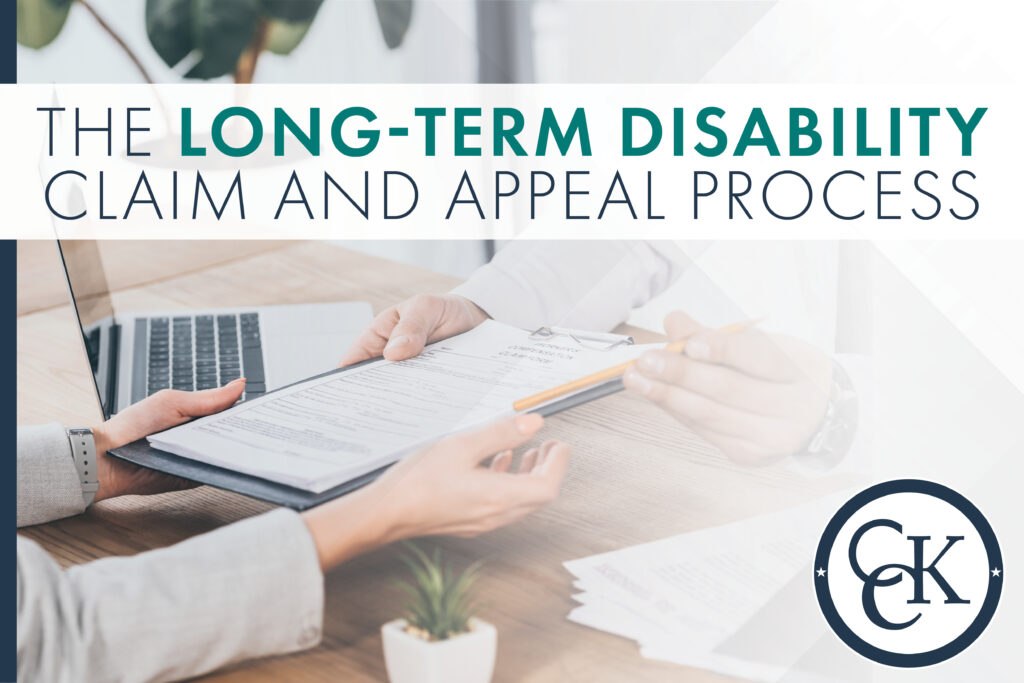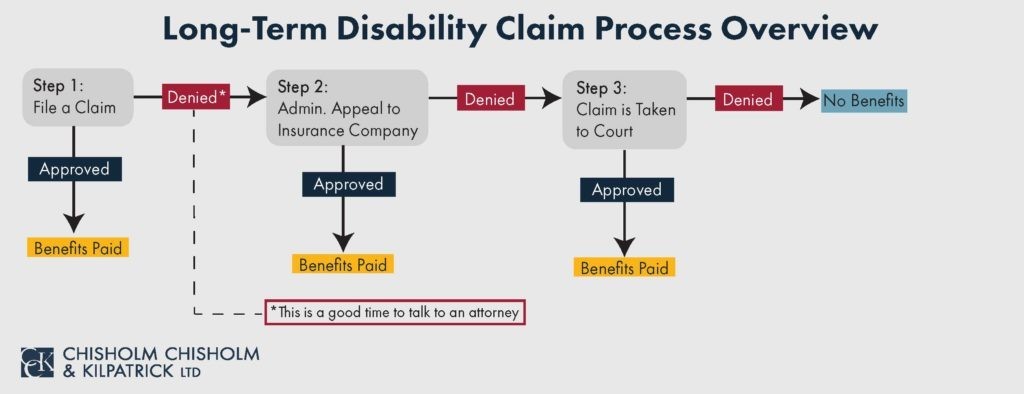The Long-Term Disability Claim and Appeal Process

The process of filing a long-term disability (LTD) claim can be complex. This process begins when an individual files a “notice of claim” with their insurer. The insurance company responds by sending them the claim forms. These forms, along with evidence, are sent back to the insurance company. Insurers proceed to review the claim and evidence and decides whether claimants meet the policy’s definition of disability and if they should receive benefits.
However, this is not the end of the process. Insurers frequently deny LTD claims. If this occurs, then claimants may need to file an administrative appeal to get their benefits. In other situations, even filing a lawsuit may be necessary.
Nonetheless, understanding the long-term disability claim and appeal process can help claimants get the benefits they need.
In this article, CCK Law will discuss:
- The initial claim stage
- The administrative appeal stage
- The litigation stage, including both state and federal court lawsuits
- And more
Why Would Someone Need to File for Long-Term Disability Benefits?
Individuals typically seek long-term disability benefits when a severe illness or injury prevents them from working for an extended period. Filing for LTD benefits—if available to them—can help protect a percentage of their pre-disability earnings. This percentage is usually between 60 and 80 percent.
Long-term disability coverage may be obtained either through a person’s employer or directly from an insurance company. Regardless of a person’s profession, these benefits can allow them to focus on their well-being.
Many medical conditions can prevent a person from working for an extended period. Such conditions include:
- Cancer
- Osteoarthritis
- Depression and anxiety
- Parkinson’s disease
- Multiple sclerosis
- Fibromyalgia
- Orthopedic Issues
- And others
The above list is not exhaustive. Many conditions may qualify for LTD benefits, but claimants must prove to their insurers that their conditions disable them under the specific terms of their policies.
The Three Stages of the LTD Claim and Appeal Process

There are up to three potential stages of the LTD claim and appeal process. These stages are:
- The Initial Claim
- The Administrative Appeal
- Litigation
This article will summarize each of these stages, but be sure to check out each individual stage’s article for more information.
The Initial Claim
The initial claim is the first stage of the LTD process. To initiate this stage, an individual must submit a “notice of claim” to their insurance company. This notice informs the insurance company that the individual wishes to file a formal claim for benefits. At this point, the insurance company will send claim forms for the individual to complete.
Claimants must complete the claim forms and gather comprehensive documentation and evidence of their disability. They submit this evidence to their insurers, who will then review it.
Importantly, the evidence and documentation should show how the claimant’s conditions and symptoms meet their policy’s definition of disability. This will either be an “own” or “any occupation” definition. (See our article on the definition of disability for more information about the different definitions your policy may contain.)
Common examples of evidence include:
- Detailed medical records
- Physician reports
- Witness statements
- Vocational evaluations
Claimants should also familiarize themselves with all filing deadlines in their policy during this stage. A missed deadline could result in a denial of their claim. For example, claimants must submit the notice of claim and proof of claim within a certain period as noted in their LTD policy.
For ERISA-governed claims, a claimant must typically wait 45 days for a decision—though this period can vary. Insurers can also take up to two 30-day extensions in certain circumstances, which means some claimants may wait upward of 105 days before receiving a decision.
If the insurance company denies the initial claim, then the claimant has the right to file an administrative appeal.

The Administrative Appeal
If your initial claim is denied, the administrative appeal stage is next. One of the most critical things to remember about this stage is that under ERISA, or the Employment Retirement Income Security Act of 1974—which governs most employer-issued LTD policies—the appeal stage is usually the last time a claimant may submit evidence supporting their claim.
Claimants with ERISA-governed LTD claims typically have 180 days to file an appeal. During this period, claimants should:
- Read their insurer’s denial letter to ascertain the specific reasons for the denial, and
- Collect additional or updated evidence that directly addresses the reasons for denial.
Additionally, the appeal stage is often the best time to seek legal help if you haven’t already. A long-term disability attorney can help collect evidence and craft a strong appeal.
Insurance companies do not like approving long-term disability claims if they can avoid it. Therefore, it is possible that they will also deny an appeal. In these situations, filing a lawsuit to obtain benefits may be necessary.
Long-Term Disability Litigation
You should read your insurance policy before attempting litigation, particularly in regard to whether your policy is covered by ERISA or not. (ERISA covers all employer group LTD plans, except for religious or governmental organizations.)
One reason is that individual policies may not require you to file an appeal before filing a lawsuit, but ERISA-governed group policies do. For ERISA policies, you must exhaust all required appeals before filing a lawsuit in court.
Another reason is that ERISA-governed lawsuits are typically filed in federal court, while non-ERISA claims are typically filed in state court and subject to state laws.
Other differences include:
| State-Law Governed LTD Claims | ERISA-Governed LTD Claims |
| Subject to state law, not federal law | Subject to federal law, not state law |
| Deference typically not shown to insurers | Deference often shown to insurers |
| Jury trials allowed | Typically no jury trials; a judge alone rules on the case |
| New evidence may be presented | No new evidence may be submitted (except in rare cases) |
| Ability to sue for other damages may be allowed | May only sue for benefits; claimants cannot seek extracontractual damages. |
Note: Many lawsuits over LTD benefits do not make it to judgement. Insurers may offer a lump-sum settlement to resolve the dispute, though claimants are not required to accept such offers. Settlement offers should be carefully considered before acceptance, as insurers’ offers typically involve releasing all claims and other terms.
Other Considerations for Long-Term Disability Claimants
Navigating the long-term disability claim and appeal process can be challenging. Each stage is unique and presents its own difficulties. Therefore, it is important for individuals unable to work due to a medical condition to be aware of what lies before them.

If you are considering an LTD claim, consider researching other aspects of the LTD claim and appeal process, like these:
- Receiving health insurance while on long-term disability
- The maximum benefit period
- The taxability of LTD benefits
- How Social Security Disability Insurance (SSDI) works with LTD
- What happens to LTD if an individual loses their job
- Offsets
- Surveillance tactics insurers use to deny claims
- Whether a person can work while receiving LTD
- And more
If you are feeling overwhelmed, you are not alone. The LTD benefits process can be extremely daunting, especially for individuals who are dealing with chronic illnesses. Consider hiring assistance to get your benefits when you need them most.
Considering Asking for Help? Call CCK Law Today
Chisholm Chisholm & Kilpatrick has been helping long-term disability claimants get their benefits for over 25 years. Our team is prepared to help you at any stage of the claims process. We’ve gone up against all the big-name insurance companies and know what to do to fight for your benefits.
Remember that deadlines can be a major factor in an LTD claim. Call us today at (800) 544-9144 for a free case evaluation with a member of our team. We will analyze your case and determine if we can assist.
